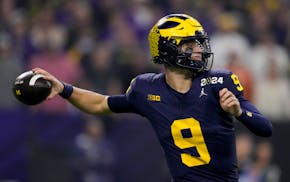After Penn State football coach Joe Paterno was fired for failing to stop reported systematic child rape by a former assistant coach who used Paterno's program as a lure for his victims, students rioted in the streets, then stood outside his house and cheered for him. Paterno emerged and waved like a pope on parade.
On Monday, Urban Meyer, who had said he resigned from his job at Florida to allegedly spend more time with his family, was hired to coach the Ohio State football team. As an ESPN employee, he had refused to answer questions about his interest in the job even to the network that paid him generously to provide insights on college football.
Tuesday night, in his first public appearance since Syracuse fired assistant basketball coach Bernie Fine because of allegations that he molested boys on team road trips, Orange coach Jim Boeheim explained his heated defense of Fine, his "friend." Team supporters allowed to watch the news conference applauded.
They cast themselves as noble leaders, as molders of young men, but the ranks of moneyed college coaches have always been filled with liars and cheats. While it's hard to embarrass this often dishonorable profession, this autumn has provided the latest reminders that these men are not to be trusted.
Absolute power corrupts absolutely, and nowhere in sports are people given absolute power the way they are when running lucrative college sports programs.
This is not to conflate Paterno's enabling with Meyer's disingenuousness and Boeheim's misguided loyalty, anymore than one would conflate murder and littering. The common thread is not the seriousness of the allegations but the lack of accountability displayed by men who are treated as gods on their campuses, and who are granted tenure once they have accumulated enough victories and dollars.
Scroll through the archives. Woody Hayes, the Ohio State deity, punched an opposing linebacker. Bobby Knight, often described as a disciplinarian, couldn't keep his hands from one player's throat, or a chair from skittering across the court. Rick Neuheisel was a high-stakes gambler, and not in the metaphoric sense.
Barry Switzer's players carried Uzis. Ron Meyer led SMU to the death penalty. Norm Stewart threatened a reporter's child. A succession of University of Miami football coaches ran a program rife with NCAA violations, and this year's scandal revealed a renegade booster who was allowed on the field and at charitable events with players, one of whom he helped with an abortion.
This fall, we have learned of a major coverup at Penn State and alleged sexual abuse by a Syracuse basketball assistant coach. In this context, Meyer, whose departure from Florida mysteriously coincided with an unexpected spate of losses, seems like a man of principle.
Gophers athletics has given us Lou Holtz, who used Minnesota as a stepladder to Notre Dame after filling Gophers fans' heads with false promises, and the successful and charismatic Clem Haskins, who presided over a particularly disgusting academic fraud scandal.
College revenue-sport coaches are the Wall Street CEOs of the sports world. If they're good, they get rich and keep their jobs. If they're not good, they get rich, then get richer on the way out the door, with buyout clauses, golden parachutes and opportunities elsewhere in the industry or in the media.
The same coaches who try to engender goodwill by detailing how they mold young men are the same coaches who regularly violate NCAA rules and even vote in their own polls dishonestly.
According to the Wall Street Journal, an analysis conducted by Yale economist Matthew Kotchen and University of Cal-Santa Barbara political scientist Matthew Potoski, football coaches voting in the USA Today poll from 2005 to 2010 regularly used their votes to improve their own lots.
According to the survey, football coaches ranked their own teams, teams in their conferences and teams that they had defeated more favorably than was merited, in an effort to improve their own rankings.
"The idea that coaches have been gaming the system is not new," Kotchen said in the Journal.
Not new at all.
Jim Souhan can be heard Sundays from 10 a.m. to noon and weekdays at 2 p.m. on 1500ESPN. His Twitter name is Souhanstrib. • jsouhan@startribune.com

Souhan: Wolves fans made Game 1 special. Now bring on Game 2.

Souhan: Should Vikings even consider McCarthy in NFL draft?

Souhan: NAW erases Suns' lead, Game 1 advantage with big performance

Souhan: This is KAT's chance to prove Flip Saunders was right


